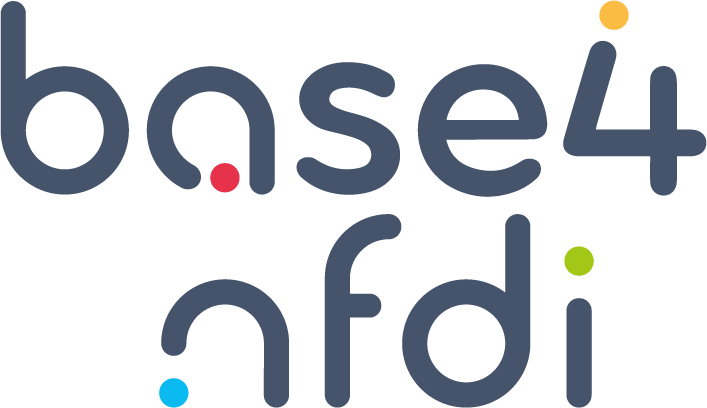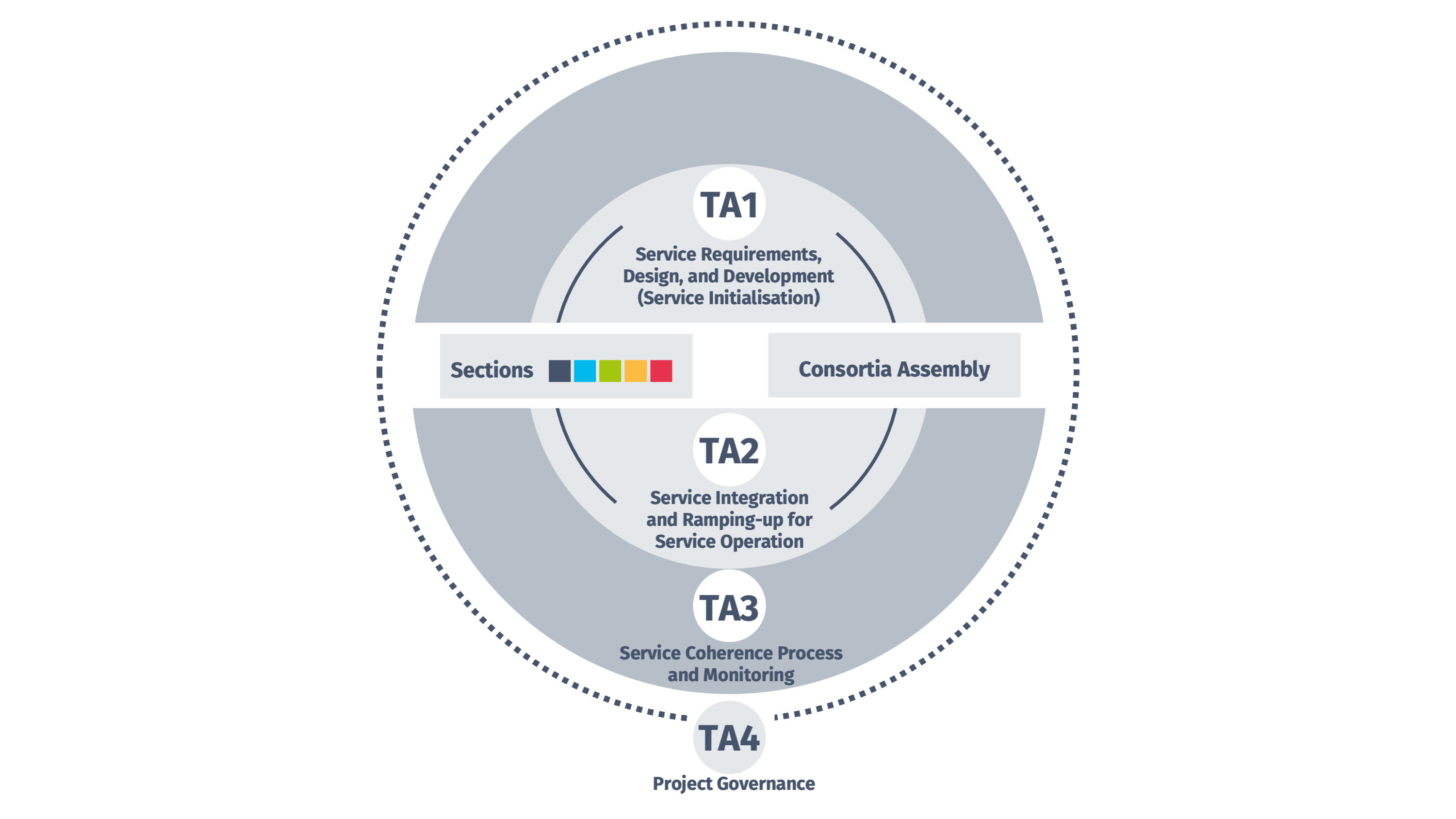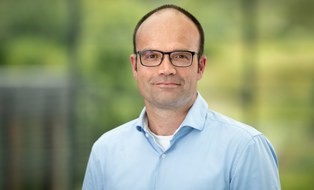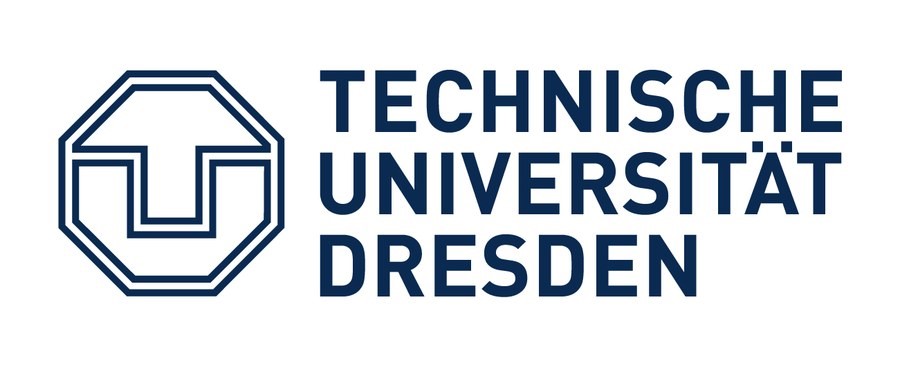
About us
NFDI-wide basic services can significantly improve efficiency and the seamless and smooth use of research data management services within and outside of NFDI. Base4NFDI is a joint initiative of all NFDI consortia. Institutions from all key areas of scientific infrastructure provision and from all major research organisations in Germany are actively involved. The target group of NFDI-wide basic services is the entire NFDI community. In its work, Base4NFDI builds on two pillars:
1) organisationally, on the participatory co-creation of basic services development by the communities within the NFDI Association;
2) technologically, on a common framework that creates quality-assured and coherent models for the continuous identification, support, development, operation and evaluation of NFDI-wide basic services.
Goals
- Integration of services to support research data management across different disciplines, data types, and existing infrastructures in NFDI
- Basic services for NFDI-wide usage
- Transparent and quality-assured bottom-up process in three stages for the establishment of a basic service, embedded in the NFDI sections
- Networking with the European infrastructure landscape (in particular EOSC)
Task Areas

TA1 Service Requirements, Design and Development
TA1 will support all activities in the NFDI sections and its working groups related to identifying potential basic services and preparing proposals for service initialization. TA1 helps to enter the initialization phase and will be backing a requirements analysis across consortia and prospective users, software evaluation and service design. All steps take place in close cooperation with the sections of the NFDI Association.
TA2 Service Integration and Ramping up for Operation
After a successful initialisation phase of a basic service candidate, Task Area 2 takes care of the following phases of integration and ramping-up. For service improvement, measures are taken to improve software quality and user acceptance.
TA3 Service Coherence Processes and Monitoring
The main goal of TA3 is to set up a coherent process, monitor the progress of individual services and the appropriateness of the selection process. It also dynamically adapts this process to the needs of providers and users. This framework specifically serves TA1 and TA2 in their tasks of gathering consortia requirements for potential basic services. TA3 ensures the seamless operation of the decision-making process, compiles all necessary information, pre-screens, prepares evaluation reports and ensures the quality assurance of the applications. TA3 thus supports the Technical Expert Committee (TEC) and the consortia assembly to carry out the required decisions.
TA4 Project Governance
TA4 acts as the coordination and management structure with the NFDI association bodies and has a particular focus on decision-making for service initialisation, integration and operationalisation of services identified. This includes assistance of the TEC. At the same time it is Base4NFDI’s conduit to national and international research and infrastructure communities beyond the NFDI. TA4’s tasks also encompass project management including risk-, financial- and contract-management, project monitoring as well as conducting an external evaluation of the project’s progress and impact on NFDI and the German science landscape, far-reaching outreach activities and drafting of policy briefings with respect to long-term operating models for basic services.
Projects
IAM4NFDI – Identity & Access Management
IAM4NFDI is concerned with connecting and expanding existing and emerging Identity and Access Management (IAM) systems in a way that researchers from different domains and institutions are able to access digital resources within NFDI as easily as possible, including access to and exchange with external infrastructures and resources like the European Open Science Cloud (EOSC). A decentralised, federated IAM is required. This way, users from approx. 400 German research and higher education institutions plus approx. 5000 home organisations worldwide -number increasing – will be able to access services and resources provided by the NFDI Community Authentication & Authorisation Infrastructure (AAI).
TS4NFDI – Terminology Services
Terminology Services 4 NFDI (TS4NFDI) is a cross domain service for the provision, curation, development, harmonization and mapping of terminologies. It aims to facilitate consensus-building and interoperability of services across disciplines to achieve a shared knowledge representation and knowledge engineering framework. The service seeks to integrate and converge individual solutions into a standardized, interoperable, and sustainable service suite with Service Wrapper, API Gateway, mapping service and reusable GUI widgets.
PID4NFDI Persistent Identifier Service
Persistent identifiered (PIDs) are central to FAIR research data management. However, different disciplines and different resources result in diverse requirements and the different NFDI consortia have different levels of maturity in PID implementation. PID4NFDI will design a work programme to build an NFDI foundation service on established PID infrastructures
Jupyter4NFDI – A central Jupyter Hub
Jupyter4NFDI aims to address the fragmented deployment of Jupyter Notebooks across NFDI consortia by offering a centralised service. This service will simplify access, improve user experience, and extend Jupyter’s reach to a wider audience within and beyond the NFDI. It plans to integrate with IAM4NFDI for access governance and to provide access to HPC resources from GCS and the NHR Alliance. By supporting reproducible research and ensuring a consistent user experience, the proposal seeks to promote innovation and democratise access to computational research infrastructures.
DMP4NFDI – Data Management Plans
DMP4NFDI is a centralised Basic Service for managing data management plans (DMPs) and software management plans (SMPs) across the NFDI. It will host the open-source DMP tool RDMO, coordinate template creation, standardise content, and offer guidance and support to consortia staff responsible for DMPs. The service aims to enhance communication among stakeholders, support data collection and review processes, and foster interoperability by engaging consortia early on to refine requirements and develop standardised DMP templates. Ultimately, DMP4NFDI seeks to maximise the benefits of widespread DMP adoption by promoting interoperability and integration across the NFDI’s research data ecosystem.
KGI4NFDI – Knowledge Graph Infrastructure
KGI4NFDI advocates for a central and reusable Knowledge Graph Infrastructure (KGI) to enhance interoperability within the research domain and support the NFDI’s objectives. It aims to provide essential components including a Knowledge Graph (KG) registry and a service for accessing KGs across NFDI projects. Additionally, the service intends to empower research communities to create decentralised KG instances using standardised approaches, technologies, and expertise. Through surveys, documentation, consulting services, and ontology harmonisation, the proposal seeks to optimise KG creation and foster standardised ontological practices, contributing to the “One NFDI” vision and promoting FAIR data principles. This initiative will complement international efforts, such as those of the European Open Science Cloud (EOSC), in advancing knowledge graph initiatives.
nfdi.software
nfdi.software aims to create a central marketplace to improve access to NFDI research software, addressing the needs of various scientific disciplines for sustainable research software use and development.
RDMTraining4NFDI
RDMTraining4NFDI is concerned with offering training in the knowledge and skills required for research data management (RDM) to all NFDI consortia. The training encompasses data, software, and machine-learning models, and is intended for the consortia’s staff, such as data stewards and trainers, as well as researchers within the respective communities. The core goal of this service is to develop a modular collection of foundational RDM training materials, along with documented, proven training formats and methods.

Prof. Dr. Lars Bernard
Coordinator
(Co-)applicant institutions and Co-Spokespersons:
- Dr. Thomas Schoerner-Sadenius – Deutsches Elektronen-Synchrotron (DESY)
- Sören Lorenz – GEOMAR Helmholtz-Zentrum für Ozeanforschung Kiel
- Regine Stein – Georg-August-Universität Göttingen, Niedersächsische Staats- und Universitätsbibliothek Göttingen
- Dr. Brigitte Mathiak – GESIS – Leibniz-Institut für Sozialwissenschaften
- Dr. Bernhard Miller – GESIS – Leibniz-Institut für Sozialwissenschaften
- Prof. Dr. Sonja Schimmler – Fraunhofer-Gesellschaft zur Förderung der angewandten Forschung e.V., FOKUS
- Dr. Raphael Ritz – Max-Planck-Gesellschaft zur Förderung der Wissenschaften, Max Planck Computing and Data Facility
- Reinhard Altenhöner – Stiftung Preußischer Kulturbesitz – Staatsbibliothek zu Berlin
- Axel Klinger – Leibniz-Informationszentrum Technik und Naturwissenschaften Universitätsbibliothek (TIB)
- Prof. Dr. Lars Bernard – Technische Universität Dresden
- Prof. Dr. Alexander Sczyrba – Universität Bielefeld
- Prof. Dr. Juliane Fluck – ZB MED – Informationszentrum Lebenswissenschaften

Technische Universität Dresden
Coordinating institution
(Co-)applicant institutions for the consortia
- Für BERD@NFDI: Universität Mannheim
- Für DAPHNE4NFDI: Deutsches Elektronen-Synchrotron (DESY)
- Für DataPLANT: Albert-Ludwigs-Universität Freiburg
- Für FAIRAgro: Leibniz-Zentrum für Agrarlandschaftsforschung (ZALF) e.V.
- Für FAIRmat: Humboldt-Universität zu Berlin
- Für GHGA: Deutsches Krebsforschungszentrum
- Für KonsortSWD: GESIS – Leibniz-Institut für Sozialwissenschaften
- Für MaRDI: Weierstraß-Institut für Angewandte Analysis und Stochastik (WIAS)
- Für NFDI4Biodiversity: MARUM – Zentrum für marine Umweltwissenschaften, Universität Bremen
- Für NFDI4BIOIMAGE: Heinrich-Heine-Universität Düsseldorf
- Für NFDI4Cat: DECHEMA Gesellschaft für Chemische Technik und Biotechnologie e. V.
- Für NFDI4Chem: Friedrich-Schiller-Universität Jena
- Für NFDI4Culture: Akademie der Wissenschaften und der Literatur | Mainz
- Für NFDI4DataScience: Fraunhofer-Gesellschaft zur Förderung der angewandten Forschung e.V.
- Für NFDI4Earth: Technische Universität Dresden
- Für NFDI4Energy: Carl von Ossietzky Universität Oldenburg
- Für NFDI4Health: ZB MED – Informationszentrum Lebenswissenschaften
- Für NFDI4Immuno: Deutsches Krebsforschungszentrum
- Für NFDI4Ing: RWTH Aachen
- Für NFDI4Memory: Leibniz-Institut für Europäische Geschichte (IEG)
- Für NFDI4Microbiota: ZB MED – Informationszentrum Lebenswissenschaften
- Für NFDI4Objects: Deutsches Archäologisches Institut
- Für NFDIxCS: Universität Duisburg-Essen
- Für NFDI-Matwerk: Fraunhofer-Gesellschaft zur Förderung der angewandten Forschung e.V.
- Für PUNCH4NFDI: Deutsches Elektronen-Synchrotron (DESY)
- Für Text+: Leibniz-Institut für Deutsche Sprache Mannheim (IDS)

Prof. Dr. Lars Bernard
Coordinator

Technische Universität Dresden
Coordinating institution
(Co-)applicant institutions and Co-Spokespersons:
- Dr. Thomas Schoerner-Sadenius – Deutsches Elektronen-Synchrotron (DESY)
- Sören Lorenz – GEOMAR Helmholtz-Zentrum für Ozeanforschung Kiel
- Regine Stein – Georg-August-Universität Göttingen, Niedersächsische Staats- und Universitätsbibliothek Göttingen
- Dr. Brigitte Mathiak – GESIS – Leibniz-Institut für Sozialwissenschaften
- Dr. Bernhard Miller – GESIS – Leibniz-Institut für Sozialwissenschaften
- Prof. Dr. Sonja Schimmler – Fraunhofer-Gesellschaft zur Förderung der angewandten Forschung e.V., FOKUS
- Dr. Raphael Ritz – Max-Planck-Gesellschaft zur Förderung der Wissenschaften, Max Planck Computing and Data Facility
- Reinhard Altenhöner – Stiftung Preußischer Kulturbesitz – Staatsbibliothek zu Berlin
- Axel Klinger – Leibniz-Informationszentrum Technik und Naturwissenschaften Universitätsbibliothek (TIB)
- Prof. Dr. Lars Bernard – Technische Universität Dresden
- Prof. Dr. Alexander Sczyrba – Universität Bielefeld
- Prof. Dr. Juliane Fluck – ZB MED – Informationszentrum Lebenswissenschaften
(Co-)applicant institutions for the consortia:
- Für BERD@NFDI: Universität Mannheim
- Für DAPHNE4NFDI: Deutsches Elektronen-Synchrotron (DESY)
- Für DataPLANT: Albert-Ludwigs-Universität Freiburg
- Für FAIRAgro: Leibniz-Zentrum für Agrarlandschaftsforschung (ZALF) e.V.
- Für FAIRmat: Humboldt-Universität zu Berlin
- Für GHGA: Deutsches Krebsforschungszentrum
- Für KonsortSWD: GESIS – Leibniz-Institut für Sozialwissenschaften
- Für MaRDI: Weierstraß-Institut für Angewandte Analysis und Stochastik (WIAS)
- Für NFDI4Biodiversity: MARUM – Zentrum für marine Umweltwissenschaften, Universität Bremen
- Für NFDI4BIOIMAGE: Heinrich-Heine-Universität Düsseldorf
- Für NFDI4Cat: DECHEMA Gesellschaft für Chemische Technik und Biotechnologie e. V.
- Für NFDI4Chem: Friedrich-Schiller-Universität Jena
- Für NFDI4Culture: Akademie der Wissenschaften und der Literatur | Mainz
- Für NFDI4DataScience: Fraunhofer-Gesellschaft zur Förderung der angewandten Forschung e.V.
- Für NFDI4Earth: Technische Universität Dresden
- Für NFDI4Energy: Carl von Ossietzky Universität Oldenburg
- Für NFDI4Health: ZB MED – Informationszentrum Lebenswissenschaften
- Für NFDI4Immuno: Deutsches Krebsforschungszentrum
- Für NFDI4Ing: RWTH Aachen
- Für NFDI4Memory: Leibniz-Institut für Europäische Geschichte (IEG)
- Für NFDI4Microbiota: ZB MED – Informationszentrum Lebenswissenschaften
- Für NFDI4Objects: Deutsches Archäologisches Institut
- Für NFDIxCS: Universität Duisburg-Essen
- Für NFDI-Matwerk: Fraunhofer-Gesellschaft zur Förderung der angewandten Forschung e.V.
- Für PUNCH4NFDI: Deutsches Elektronen-Synchrotron (DESY)
- Für Text+: Leibniz-Institut für Deutsche Sprache Mannheim (IDS)